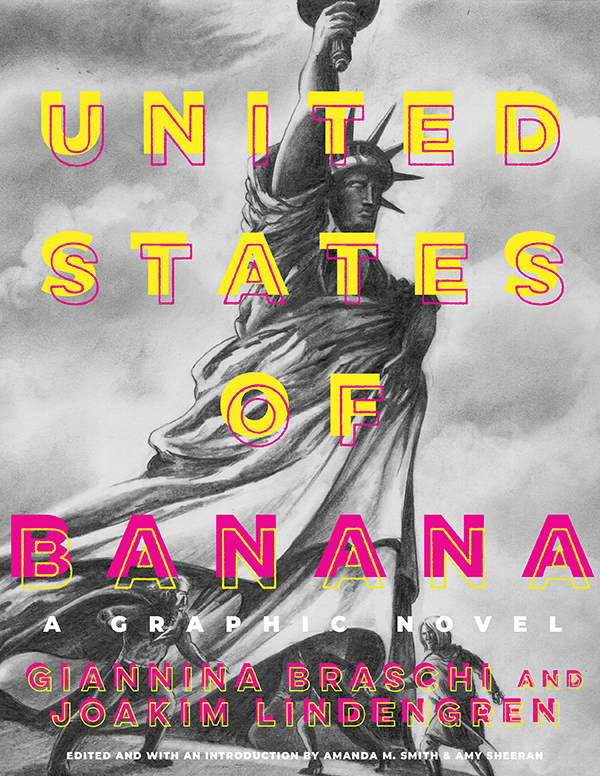Puerto Rican graphic novels such as “United States of Banana” by Giannina Braschi teach students real-world lessons about Puerto Rican history and American politics.
“I was a monument to immigration—now I’m a border control cop.” So admits the Statue of Liberty in Giannina Braschi’s United States of Banana, a rollicking and nakedly political allegory of US imperialism and Puerto Rican independence. Illustrated by Swedish comic book artist Joakim Lindengren and based on Braschi’s epic manifesto by the same title, the story takes us along on the madcap adventures of Zarathustra, Hamlet, and Giannina herself as they rescue the Puerto Rican prisoner Segismundo from under the skirt of the Statue of Liberty. Throughout their quest, the characters debate far-ranging political and philosophical subjects, spanning terrorism, global warming, mass incarceration, revolution, and love. The Marx Brothers, Pablo Neruda, Barack Obama, Disney characters and more make appearances in this stirring call to overthrow empire, liberate the imprisoned masses, and build a new country rooted in friendship, art, poetry, and laughter.
Teachers’ guide for classroom discussions on Puerto Rican graphic novels
United States of Banana, The Ohio State University Press
Otterbein Professor Worked on Graphic Novel Connecting History and Pop Culture for Students

By Madelyn Nelson, Otterbein University
Amy Sheeran wanted to bring culture into her Otterbein classroom, and she acted on it. Sheeran, assistant professor of Spanish Modern Languages and Cultures, co-edited a graphic novel, United States of Banana, by Giannina Braschi, which intersects pop culture, history, and works of art and literature in a fictional story with real-world lessons.
While in graduate school at Johns Hopkins University, Sheeran met Amanda M. Smith, co-editor of the graphic novel. The two kept in contact and years after their initial meeting, Sheeran helped co-edit United States of Bananas, which released in March 2021. The novel is a political allegory of U.S. imperialism and Puerto Rican independence.
Puerto Rican Graphic Novel Lessons for Life
“One of the things that I really love about this novel is that there is an entry point for everyone, it’s a lot of collage and riffing and bringing things that seem unconnected, together,” said Professor Sheeran. “There are characters from different works of literature, a bunch of pop culture references, commercial jingles, everyday sayings, so I think there’s some way for everyone reading it to get into it, regardless if they have read Hamlet or works of philosophy.”
Amy Sheeran, United States of Banana / Puerto Rican Graphic Novels

The graphic novel opens doors to many works of literature, history, and culture, but was also created as a tool for educators.
“My co-editor conceived it specifically as something that would be useful in the classroom because we wanted to be able to connect teaching and research,” said Sheeran. “We have discussion questions in the back of the book to help us and other educators find ways to use it in their classrooms.”
Sheeran wanted the novel to propel conversations around different cultures and works of art in the classroom setting, which she has introduced to her Otterbein courses.
Beyond the entertaining illustrations and pop culture references and characters, Sheeran recognizes the benefit of introducing the graphic novel to her students and hopes they gain a deeper understanding of culture.
“I hope students learn more about the history and culture of Puerto Rico, and role of the United States in the history of Puerto Rico, in terms of defining its contested political status and in terms of the cultural exchange we imagine that there is in culture in the mainland United States and in Puerto Rico,” she said.
Sheeran reflected on her experience teaching Integrative Studies (INST) courses and how they provide Otterbein faculty the opportunity to explore various classroom topics in real-world research and projects.
“My INST class is strongly based on another research project I’m hopefully wrapping up soon, so there’s a really strong exchange between what I’m doing in researching and writing, and what I’m teaching at Otterbein,” said Sheeran. “I think the freedom to develop interdisciplinary classes here is something that makes that a lot easier, and I hope makes it apparent to students why the things we talk about in classes matter.”
Another takeaway Sheeran hopes her students gain from the graphic novel is an overall sense of different voices in literature and how they connect.
“Since this graphic novel brings in so many voices and aspects of culture,” Sheeran said, “I think it really helps illustrate that for students and helps them see different kinds of connections that may not have thought about before.”
Otterbein faculty set the example for students and bring the students in on important topics they are tackling in their own research and education. Tools like the United States of Banana demonstrate to students how real-world events impact their education.
United States of Banana is available on Amazon and will soon be available for students and faculty to borrow through the Otterbein library. The graphic novel can also be found at The Ohio State University Press.
Puerto Rican Graphic Literature
Giannina Braschi’s radical thinking is the subject of Poets Philosophers Lovers: on the Writings of Giannina Braschi (Latinx and Latin American Profiles, Pittsburgh, 2020), a collection of essays edited by Professor Latinx Frederick Luis Aldama and Tess O’Dwyer with a foreword by Ilan Stavans. The United States Library of Congress calls Braschi work “cutting-edge, influential and even revolutionary.” In recent years, her avant-garde writings have appeared in far-ranging cultural spaces such as television comedy, chamber music, art and design, theater, and ecologic urbanism. United States of Banana: A Graphic Novel comes with classroom prompts about Golden Age Spanish theater, Puerto Rican culture and history, and American politics today. This Latinx graphic novel teaches real world lessons about the legacy of US colonialism.
Tags: Puerto Rican graphic novels, Puerto Rican comic books, Puerto Rican philosophy books
Click to read an essay on Puerto Rican graphic novels.
